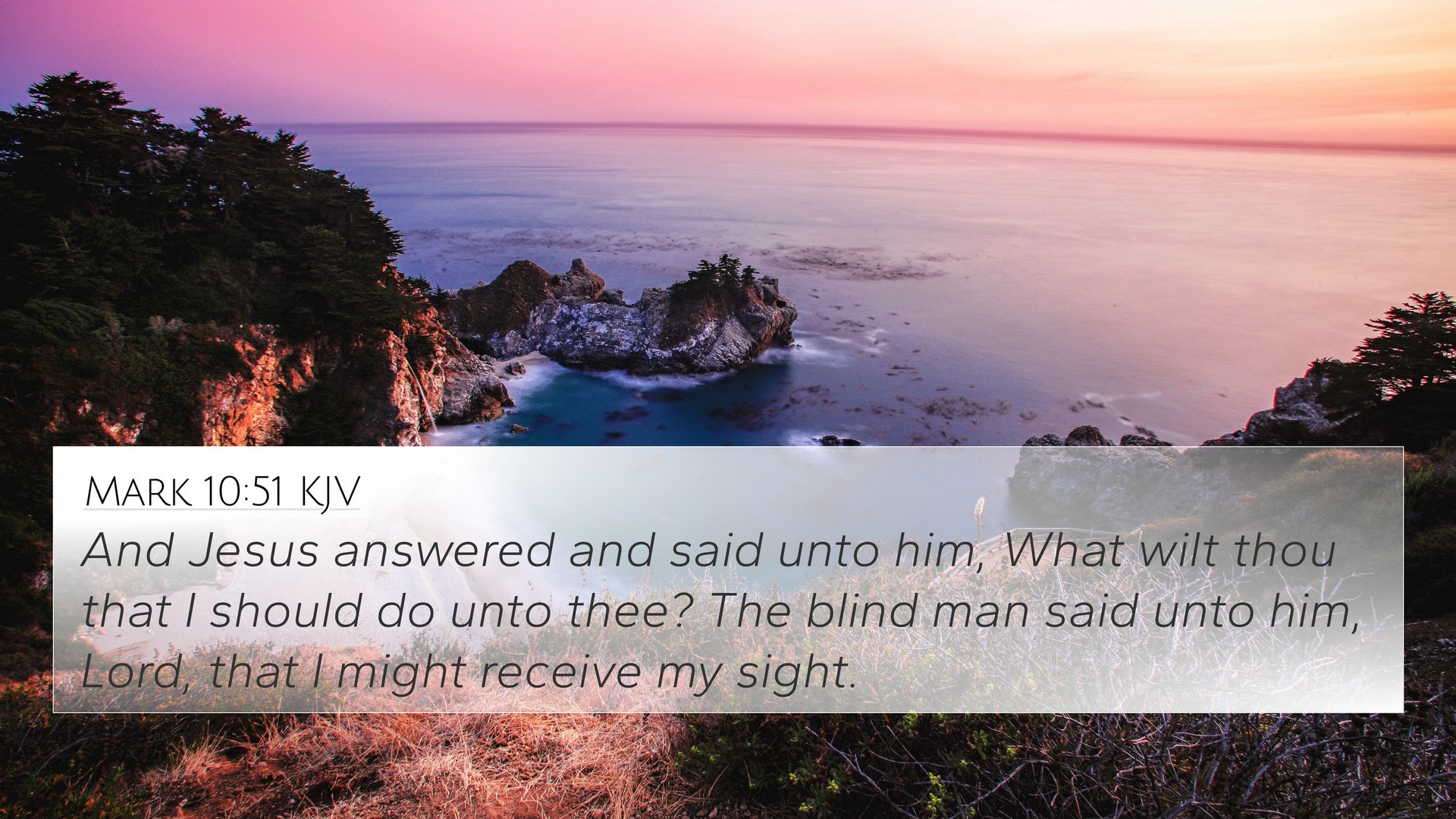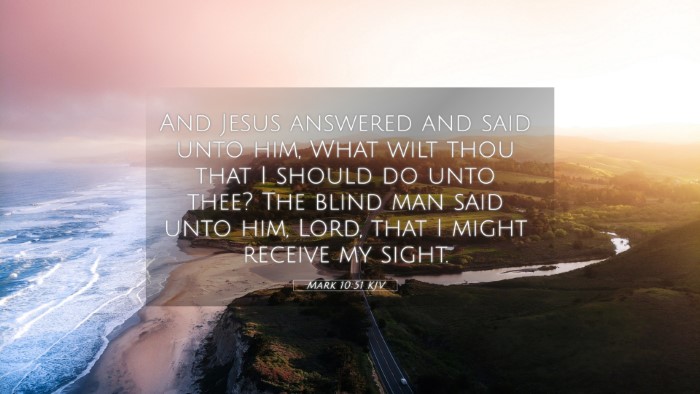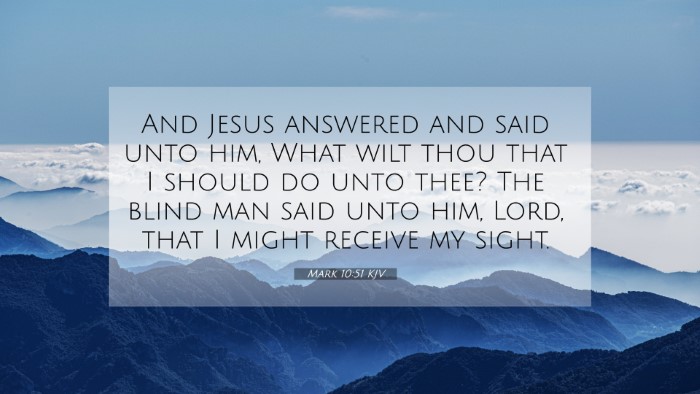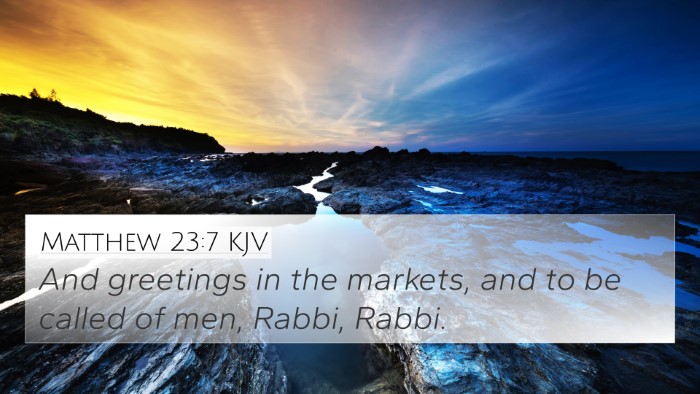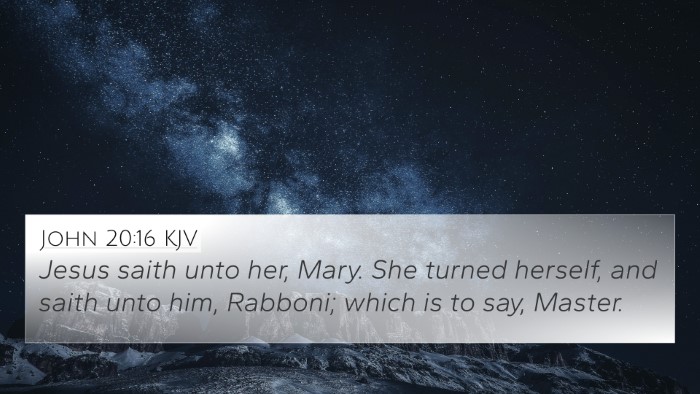Understanding Mark 10:51
Mark 10:51 states: "And Jesus answered and said unto him, What wilt thou that I should do unto thee? The blind man said unto him, Lord, that I might receive my sight." This verse depicts a significant moment in the Gospel where Jesus encounters a blind man, Bartimaeus, who calls out to Him in desperation. The verse offers profound insights into the nature of faith, divine compassion, and the transformative power of Christ.
Context and Overview
The context of Mark 10:51 occurs as Jesus is on His way to Jerusalem, preparing for His impending crucifixion. Bartimaeus, a blind beggar, sits by the roadside, begging for alms but he sees Jesus as more than just a miracle worker—he perceives Him as the Messiah. His cry for mercy demonstrates persistent faith, and Jesus' response reveals His willingness to engage with those in need.
Commentary Insights
-
Matthew Henry's Commentary:
Henry emphasizes the significance of Bartimaeus's faith, contrasting it with the lack of faith shown by disciples and the crowds. He notes that Bartimaeus's boldness and persistence in calling out to Jesus illustrate the characteristic of true faith, which does not shy away from expressing its needs. Furthermore, Henry highlights that Jesus's inquiry into what Bartimaeus desires is an invitation to articulate one's needs before God.
-
Albert Barnes' Notes:
Barnes points out that Jesus's question, "What wilt thou that I should do unto thee?" serves to affirm the personal relationship between the Savior and those He helps. It suggests not only that Jesus wants to know the specific request, but also indicates that God seeks our heartfelt requests and desires our active participation in faith. This underscores that Jesus is not just a healer but also a compassionate figure who wishes to restore dignity to those suffering.
-
Adam Clarke's Commentary:
Clarke discusses the cultural background of the request and highlights the significance of sight as a metaphor for spiritual enlightenment. He asserts that Bartimaeus's request was not just about physical sight but also a deeper yearning for spiritual insight. Clarke reminds readers that this narrative invites them to reflect on their own spiritual blindness and their need for Christ’s healing touch.
Thematic Cross-References
Mark 10:51 can be understood more fully by exploring various Bible cross-references that connect with its themes:
- John 9:1-7 - The healing of the man born blind exemplifies Jesus's power to grant sight, both physically and spiritually.
- Matthew 9:27-31 - Similar healing narratives that demonstrate faith and Jesus's mercy.
- Luke 18:35-43 - Provides another account of Bartimaeus and emphasizes the urgency of calling upon Jesus.
- Isaiah 35:5-6 - Prophetic verses declaring God’s intention to open the eyes of the blind.
- Mark 8:22-26 - Illustrates the gradual healing of a blind man, contrasting with Bartimaeus’s immediate sight restoration.
- James 1:5 - Encouragement to ask God for wisdom, reflecting the principle of asking in faith.
- Hebrews 11:6 - Affirms the necessity of faith in approaching God and receiving His blessings.
Application for Modern Readers
The message of Mark 10:51 is timeless and relevant for believers today. It encourages individuals to approach Jesus with their requests, fully trusting in His power to heal and provide. This verse challenges readers to recognize their own areas of spiritual blindness and seek Jesus for clarity and vision in their lives.
Conclusion
Mark 10:51 stands as a pivotal scripture that showcases the intersection of faith, need, and divine response. Through the experiences of Bartimaeus, believers are reminded of the importance of persistent faith, the assurance of Jesus’s compassion, and the transformative nature of His help. Engaging with this verse encourages a deeper understanding of the interplay between human desperation and divine intervention.
Related Study Tools
To deepen the exploration of Mark 10:51 and its connections with other scriptures, consider using:
- Bible concordances for identifying related verses.
- Cross-reference Bible study guides for thematic connections.
- Comprehensive Bible cross-reference materials for thorough analysis.
- Interlinear Bibles for nuanced understanding of keywords.
